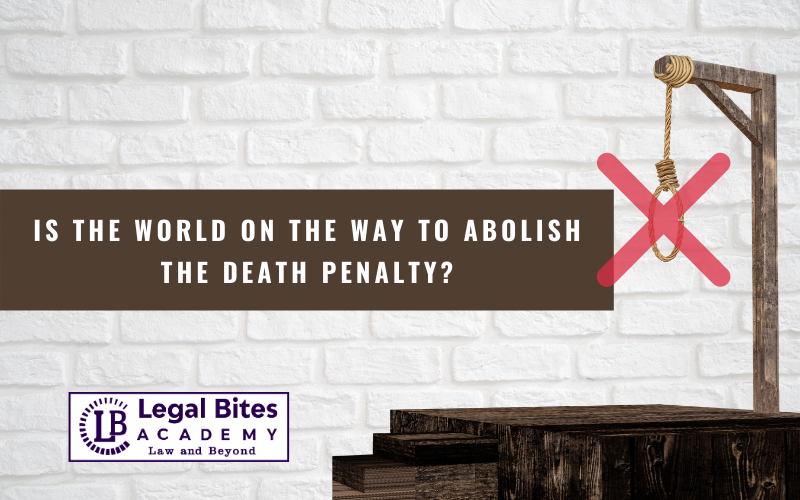Is the World on the Way to Abolish the Death Penalty?
In recent years, a lot of progress has been made in terms of trying to abolish the death penalty. Hopefully, the numbers of executions worldwide keep going down and soon capital punishment can become a cruel punishment of the past. Is the World on the Way to Abolish the Death Penalty? Capital punishment deprives individuals of the right… Read More »

In recent years, a lot of progress has been made in terms of trying to abolish the death penalty. Hopefully, the numbers of executions worldwide keep going down and soon capital punishment can become a cruel punishment of the past.
Is the World on the Way to Abolish the Death Penalty?
Capital punishment deprives individuals of the right to life, which was established by article 3 of the Universal Declaration of Human Rights (UDHR). Hence, the practice has been condemned by the international community, and the European Union describes it as ‘the ultimate cruel, inhuman and degrading punishment’. Sadly, however, hundreds of people continue to be executed around the world for offences that often should not be punishable by death.
In its latest report, Amnesty International revealed that in 2020 around 483 executions took place in 18 countries. This number was, fortunately, the lowest in over a decade and indicated a decrease of almost 30 per cent from the previous year when 657 executions were recorded. Amnesty International also reported that as of April 2021, ‘144 countries have abolished the death penalty in law or practice’. The world is on the right track to eradicate capital punishment, but there is still a lot of work to be done.
Inhuman execution methods
Nowadays, lethal injection is the most commonly used to execute offenders. It is often considered to be the most humane method and introducing it put an end to painful executions that would take place in front of hundreds of onlookers. Nevertheless, some countries still use other methods that have been deemed controversial. For example, Saudi Arabia is the only country where people are publicly executed by beheading. It has also been reported that before executions, convicts are tortured and face unfair trials. In Iran, executions are carried out by hanging, using gallows designed specifically to break offenders’ necks. Iran is also notorious for sentencing people to other brutal punishments such as amputation or blinding.
No matter which method a state uses and no matter how severe the crime is, ending convicts’ lives is extremely brutal. Moreover, countries that have been accused of torturing the prisoners and using cruel execution methods deny it, so it is impossible to know the real scale of the problem.
The extent of juvenile executions
Sentencing those under the age of eighteen to death is prohibited by international law and it breaches the Convention on the Rights of Child (CRC) and the International Covenant on Civil and Political Rights. Nevertheless, three countries, namely Iran, Saudi Arabia, and South Sudan are known to carry out juvenile executions.
In Iran, when boys turn thirteen they become liable to death sentence. For girls, the age limit is even lower, and they become liable to death sentence when they turn nine. Minors can be sentenced to death for offences such as repeatedly drinking alcohol, being in a homosexual relationship, or insulting the Prophet. Saudi Arabia organised mass executions in 2016 and 2019 and killed 10 children altogether. After the events, it was reported that all the minors who were executed had been tortured. In South Sudan, which is the youngest nation in the world, executions have been on the rise in recent years and at least 2 children have been executed since 2018.
Juvenile executions are particularly cruel as many children and adolescents are coerced into committing offences. They often live in poverty and have limited social and professional opportunities so they resort to crime to provide for themselves. In turn, they become vulnerable to abuses and can be easily manipulated by people who force them to carry out illegal activities for them in exchange for money.
Reasons to abolish capital punishment
No one should have the right to decide whether a person should live or not, and capital punishment represents a vicious, inhuman punishment. The death penalty is irreversible and in the case where a mistake is made and an innocent person is executed, there is no way to fix it. In the United States, for example, at least 20 people were wrongly convicted and executed. Furthermore, the death penalty does not lead to reducing crime rates. In fact, it has been deemed the least effective form of punishment by American police chiefs and law enforcement professionals as executions do not address true causes of crime.
Capital punishment does not deter criminals and it continues the endless cycle of violence in which the state kills people for killing others without actually making them realise their mistakes and pay for them. Generally, life imprisonment, which makes people reflect on their crimes and feel remorse for many years, is considered to be a more effective punishment than the death penalty.
In recent years, a lot of progress has been made in terms of trying to eradicate the death penalty. Hopefully, the numbers of executions worldwide keep going down and soon capital punishment can become a cruel punishment of the past.
Author: Katarzyna Rybarczyk
Katarzyna Rybarczyk is a Political Correspondent for Immigration News. This is a media platform that helps to raise awareness about migrant injustices and news around the world and helps people get immigration advice.


